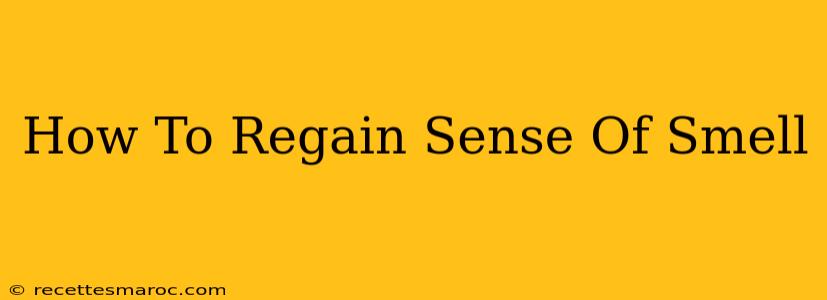Losing your sense of smell, also known as anosmia, can be incredibly disruptive to your life. It impacts not only your enjoyment of food and fragrances but can also be a warning sign of underlying health issues. While some causes of anosmia are temporary, others require medical attention. This guide explores various ways to potentially regain your sense of smell and when to seek professional help.
Understanding Anosmia: Causes and Types
Before diving into solutions, it's crucial to understand why you've lost your sense of smell. Anosmia can stem from various factors, including:
- Viral Infections: The common cold, flu, and COVID-19 are frequent culprits, often causing temporary anosmia.
- Allergies: Seasonal allergies or reactions to specific substances can temporarily impair your sense of smell.
- Sinus Infections: Inflammation and congestion in the sinuses can block olfactory receptors.
- Head Injuries: Trauma to the head can damage the olfactory nerves.
- Neurological Conditions: Certain neurological disorders like Parkinson's disease and Alzheimer's disease can affect the sense of smell.
- Medications: Some medications can list anosmia as a side effect.
- Nasal Polyps: These growths in the nasal passages can obstruct airflow and impair smell.
Different Types of Anosmia:
Understanding the type of anosmia you experience is crucial for effective treatment. These include:
- Complete Anosmia: Complete loss of smell.
- Partial Anosmia: Reduced ability to smell, but not a complete loss.
- Dysosmia: Distorted sense of smell, where things smell different than they should.
- Phantosmia: Hallucinating smells that aren't actually there.
How to Regain Your Sense of Smell: Potential Strategies
The best approach to regaining your sense of smell depends heavily on the underlying cause. If your anosmia is due to a temporary illness like a cold, patience and supportive measures are often sufficient. However, persistent anosmia requires professional medical evaluation.
Self-Care Strategies:
- Hydration: Staying well-hydrated helps clear nasal passages and improve overall health. Drink plenty of water!
- Nasal Irrigation: Using a saline nasal rinse can help clear nasal congestion and remove irritants. Consult your doctor or pharmacist on proper technique.
- Humidifier: A humidifier can add moisture to the air, preventing nasal dryness which can exacerbate the problem.
- Avoid Irritants: Steer clear of strong fumes, chemicals, and dust to prevent further irritation of the nasal passages.
- Smell Training: This involves regularly smelling different scents (e.g., lemon, clove, eucalyptus, rose) for several minutes each day. This can help retrain your olfactory system. Consistency is key!
Medical Interventions:
For persistent anosmia, a doctor might recommend:
- Corticosteroids: To reduce inflammation in the nasal passages.
- Antibiotics: If a bacterial infection is the underlying cause.
- Surgery: In cases of nasal polyps or other structural issues blocking airflow.
When to See a Doctor:
It's crucial to seek medical attention if:
- Anosmia persists for more than a few weeks.
- You experience a sudden loss of smell.
- You have other symptoms, such as facial pain, fever, or discharge.
- You suspect an underlying medical condition.
Boosting Your Overall Sense of Smell
Even if you've regained some or all of your sense of smell, you can enhance your olfactory experience through lifestyle choices:
- Healthy Diet: A balanced diet rich in antioxidants and vitamins supports overall health, including olfactory function.
- Regular Exercise: Physical activity improves circulation and overall well-being, which can indirectly benefit your sense of smell.
- Stress Management: Chronic stress can negatively impact your senses. Practice stress-reducing techniques like yoga or meditation.
Conclusion
Regaining your sense of smell can be a journey that requires patience and potentially, medical intervention. By understanding the causes of anosmia and following the appropriate strategies, you can increase your chances of a successful recovery. Always consult with a medical professional to diagnose the cause of your anosmia and determine the best course of action. Don't hesitate to seek help—your sense of smell is an essential part of your overall well-being.

